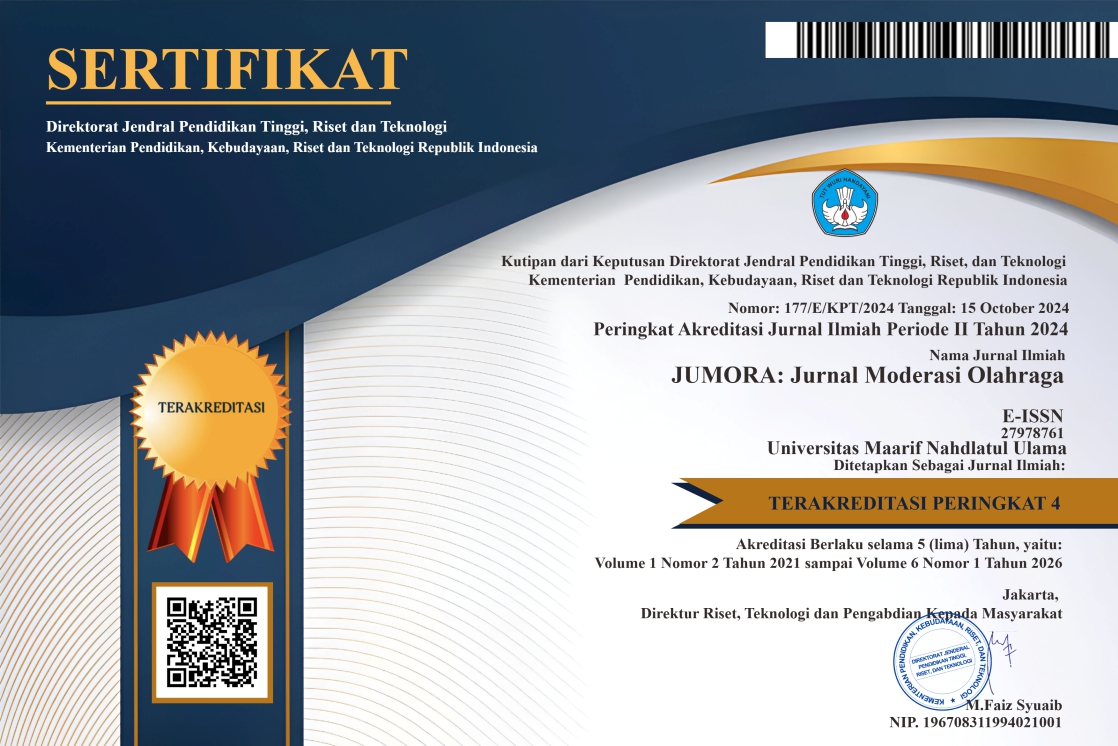Analysis of 1000-meter run in Sportyjoy Club athletes in Cimahi City: A biomechanical sports perspective
DOI:
https://doi.org/10.53863/mor.v4i2.1423Keywords:
Biomechanics, 1000-Meter Run, Kinematics, Motion AnalysisAbstract
The importance of understanding biomechanics in sports, particularly in running activities, significantly contributes to improving athletes' techniques and performance. This study aims to analyze the 1000-meter running motion of athletes from the Sportyjoy Club in Cimahi City through a sports biomechanics review. The study employs a descriptive analytical method with a one-shot case study design. Kinematic data were obtained from video recordings analyzed using Kinovea software (version 2023.2.1). The study sample comprised 10 middle-distance athletes aged 11–14 years selected through purposive sampling. The results showed that the athletes' average running speed was 3.88 ± 0.68 m/s, with a maximum speed of 5.00 m/s and a minimum speed of 2.87 m/s. The average stance phase duration was 0.21 ± 0.05 seconds, while the swing phase lasted an average of 0.32 ± 0.09 seconds. Biomechanical parameters such as arm flexion angle (57.25 ± 9.69⁰) and knee height (0.45 ± 0.06 m) were also analyzed to evaluate running efficiency. Based on physical fitness assessments, 2 athletes were categorized as very good, 4 as good, 1 as fairly good, and 3 as poor. This study demonstrates that running efficiency is influenced by the stance and swing phases, arm flexion angles, and knee height. Therefore, coaches and athletes can use these findings to improve running techniques, enhance performance, and reduce injury risk through a biomechanical approach
References
Al Ardha, M. A., Yang, C. B., Nurhasan, Kartiko, D. C., Kuntjoro, B. F. T., Ristanto, K. O., Wijaya, A., Adhe, K. R., Putra, K. P., Irawan, F. A., Nevangga, R. P., Sasmita, N. S., & Rizki, A. Z. (2022). Biomechanics analysis of elementary school students’ fundamental movement skill (FMS). Proceedings of the International Joint Conference on Arts and Humanities 2021 (IJCAH 2021), 618, 471–476. https://doi.org/10.2991/assehr.k.211223.082
Arikunto, S. (2013). Prosedur Penelitian Suatu Pendekatan Praktik. VI Cetakan Ketiga Belas Jakarta: PT Rineka Putra.
Baktiyaningsih, L., & Irawan, F. A. (2023). Analisis lari 1000 meter pada anak Sekolah Dasar Bina Amal Kota Semarang: Tinjauan biomekanika olahraga. Jurnal of S.P.O.R.T, 7(1), 137–147. https://jurnal.unsil.ac.id/index.php/sport/article/view/6587
Darumoyo, K., Hartanto, S., & Widodo. (2006). Hubungan berat badan, tinggi badan, panjang tungkai, dan kekuatan otot tungkai dengan penampilan berlari serta analisis kesalahan gerak berlari siswa putra SMK Penerbangan Angkasa Lanud Iswahyudi kelas X dan XI.
Darwis, N. (2016). Perbandingan agility antara normal foot dan flat foot pada atlet unit kegiatan mahasiswa basket di kota Makasar. [Thesis]. Universitas Hasanudin. http://repository.unhas.ac.id/handle/123456789/19344
Indra, G., & Lumintuarso, R. (2014). Peningkatan hasil pembelajaran lari sprint 60 meter melalui metode permainan SDN 009 Teluk Pelalawan. Jurnal Keolahragaan, 2(2), 155–169. https://doi.org/10.21831/jk.v2i2.2611
Hardianto, M. S. (2019). The influence of legs length, legs explosive power, and self-confidence on 60-meter running ability of students at SDN Mattoanging 2 Makassar. [Thesis/Dissertation]. Program Pascasarjana, Universitas Negeri Makassar.
Irawan, F. A., Hadi, Romadhoni, S., Permana, D. F. W., & Billah, T. R. (2021). Be fit bye fat sebagai metode peningkatan derajat kebugaran jasmani pegawai Pertamina MOR IV Semarang. JOSSAE (Journal of Sport Science and Education), 6(1), 67–73. https://doi.org/10.26740/jossae.v6n1.p67-73
Irawan, F. A., Jannah, S. P., Fajar, D., Permana, W., & Nurrachmad, L. (2021). Mawashi geri di kelas kadet junior karate: Analisis kinematik. Jurnal Universitas Hunan, September, 1–7. http://jonuns.com/index.php/journal/article/view/755/752
Irawan, F. A., & Long-Ren, C. (2015). Pitching biomechanics and injury prevention to improving performance for young baseball pitchers – A review. 1st Unnes International Conference on Research Innovation & Commercialization for the Better Life, January, 356–359. https://www.researchgate.net/publication/330306267
Irawan, F. A., & Long-Ren, C. (2019). Baseball and biomechanics: Injury prevention for baseball pitcher. Jurnal Keolahragaan, 7(1), 57–64. https://doi.org/10.21831/jk.v7i1.24636
Irawan, F. A., Nurrahmad, L., & Permana, D. F. W. (2020). The association of arch height index and arcus pedis on agility: An overview of sport science college students. International Journal of Innovation, Creativity and Change, 14(11), 669–676. www.ijicc.net
Jariono, G., Subekti, N., Indarto, P., Hendarto, S., Nugroho, H., & Fachrezzy, F. (2020). Analisis kondisi fisik menggunakan software Kinovea pada atlet taekwondo Dojang Mahameru Surakarta. Transformasi: Jurnal Pengabdian Masyarakat, 16(2), 133–144. https://doi.org/10.20414/transformasi.v16i2.2635
Kapri, E., Mehta, M., & S, K. (2021). Biomechanics of running: An overview on gait cycle. International Journal of Physical Education, Fitness and Sports, 10(3), 1–9. https://doi.org/10.34256/ijpefs2131
Ks., Bambang, Hakim, A. A., & Kusuma, M. N. H. (2014). Biomekanika olahraga (tingkat dasar). Asdep Tenaga Keolahragaan, Deputi Bidang Peningkatan Prestasi Olahraga, Kemenpora.
Lohman, E. B., Balan Sackiriyas, K. S., & Swen, R. W. (2011). A comparison of the spatiotemporal parameters, kinematics, and biomechanics between shod, unshod, and minimally supported running as compared to walking. Physical Therapy in Sport, 12(4), 151–163. https://doi.org/10.1016/j.ptsp.2011.09.004
Maksum, A. (2012). Metodologi penelitian dalam olahraga. Unesa University Press.
Nurhasan. (2013). Tes dan pengukuran pendidikan olahraga. FPOK UPI.
Nurhuda, K., & Jannah, M. (2018). Pengaruh meditasi mindfulness terhadap mental toughness pada atlet lari 400 m. Character: Jurnal Penelitian Psikologi, 5(3), 1–7. https://doi.org/10.26740/cjpp.v5i3.26185
Optimal Movement. (n.d.). The importance of running technique. Optimal Movement. Retrieved November 11, 2024, from https://optimal-movement.co.uk/omguide/endurance-training/the-importance-of-running-technique
Pasau, M. Anwar. 1986. Memilih Atlet untuk Menghasilkan Prestasi Prima dalam Olahraga, Makalah Simposium Olahraga. Surabaya.
Sugiyono. (2013). Metode Penelitian Kuantitatif, Kualitatif dan R&D. Alfabeta.
Yapinus, P. P., & Rukmantara, A. R. N. (2018). Sistem otomatisasi pengendalian treadmill. Jurnal Teknik Informatika Dan Sistem Informasi, 4(1), 185–194. https://doi.org/10.28932/jutisi.v4i1.763
Downloads
Published
How to Cite
Issue
Section
License
Copyright (c) 2024 Yana Erlangga, Agus Gumilar, Salman Salman, Jihan Choirunnisa

This work is licensed under a Creative Commons Attribution-ShareAlike 4.0 International License.
Authors retain copyright and grant the journal right of first publication with the work simultaneously licensed under a Creative Commons Attribution-ShareAlike 4.0 International License that allows others to share the work with an acknowledgment of the work’s authorship and initial publication in this journal











